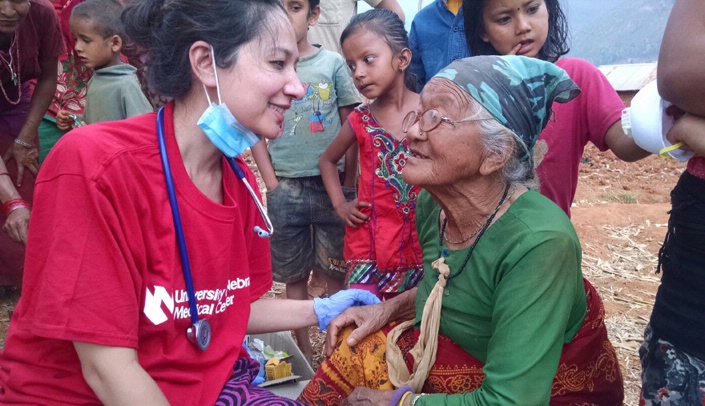Children wake from nightmares about earthquakes shouting “ayo ayo” – it’s coming again.
“No one wants to hear the word ‘ayo,’ said Poonam Joshi, M.B.B.S., pharmacology/experimental neuroscience, who is in Kathmandu to help with relief efforts.
And then it did.
Relief efforts
UNMC continues to raise money for relief efforts that may be needed for at least a year through the Nepal Relief Fund, established by the University of Nebraska Foundation.
Tuesday, a second major earthquake in less than three weeks — this one 7.3-magnitude — struck Nepal, killing at least 125 people and injuring more than 2,500.
Nepal was already struggling to deal with the aftermath of its worst earthquake in more than 80 years that killed at least 8,046 people, injured more than 17,800 and damaged or destroyed more than 10 percent of Nepalese homes, including entire villages.
This week’s quake released a new surge of panic among shellshocked Nepalis, said Dr. Joshi, who packed up donated supplies and flew to her native country to join relief efforts four days after the 7.8-magnitude earthquake hit April 25. She returns Sunday.
Dr. Joshi is working with Baidya and Banskota (B&B) Hospital, with the permission and support of her mentor, Channabasavaiah Gurumurthy, Ph.D., assistant professor, genetics, cell biology and anatomy.
She described her experience in an email to Dr. Gurumurthy and Ali S. Khan, M.D., M.P.H., dean of the College of Public Health.
“My heart goes out most to the children who survived. Almost every child saw death and horror in the eyes of the people around them. Some kids try to console their toys that it’s all going to be over soon. Most mothers complain that the children are not eating well. We just hand out candies and toys to try to bring a smile to their faces. The Israelis had medical clowns in their team, which I think was amazing.
“The possibilities of conducting medical day camps are negligible as there have been multiple landslides that continue. The only way for aid to reach the affected areas is by air, which the Nepal Army and Police are doing.
“I see many cases of anxiety disorder, which most likely will be diagnosed as acute stress disorder. Even my parents are always scared as we are still getting aftershocks.
“Now in the hospitals, we see cases of poisoning because people are depressed and trying to commit suicide. I had to counsel almost every patient in the village I visited today as the entire village was destroyed. It was very hard. They need shelter more than anything right now as the monsoon is almost here. I hope this will help us plan better for the relief team.”
Dr. Gurumurthy said the country needs a large amount of help and sustained support to recover from this tragedy. “We are proud that Dr. Joshi has helped at least a few victims in whatever level she could help them.”
Dr. Khan said that Dr. Joshi’s contribution and dedication to the relief efforts are “inspiring. She is so brave as she continues to tend to the physical and mental health needs in many of the makeshift camps made up of survivors.”

Commendable work of a lady doc. Salute your brave job.
Bravo Dr. Joshi.
Dr. P. Joshi,
Salute for the service rendering by you. You came from USA to serve the people affected by massive earthquake,2012 and your mother land at this critical situation.
K.M. Palikhya and Tara Palikhya